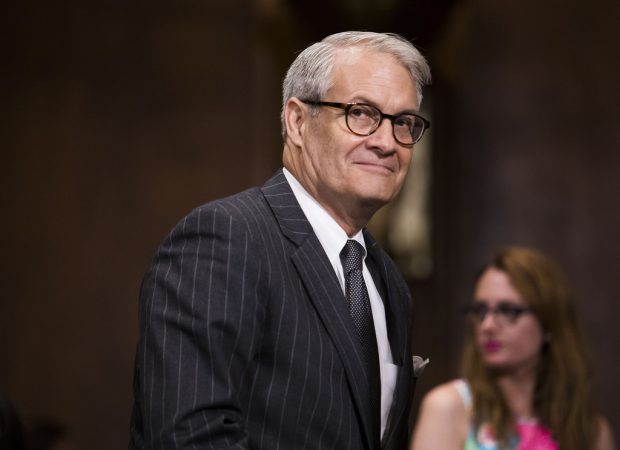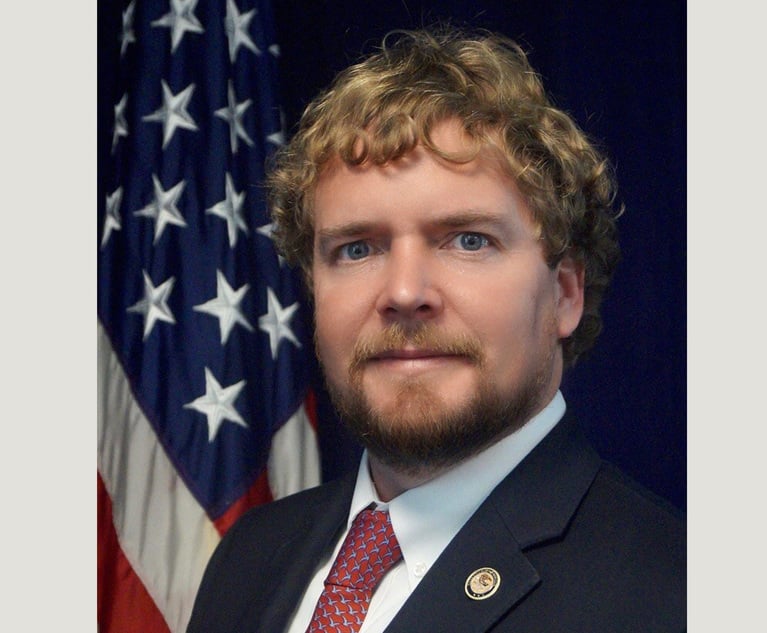'It's Kind of a Mess': Phone Arguments Get Rocky Debut at DC Circuit During COVID-19 Pandemic
Judge Thomas Griffith said he was locked out of arguments for five to six minutes after he got dropped from the phone conference.
March 20, 2020 at 01:05 PM
8 minute read
The original version of this story was published on National Law Journal
 Judge Thomas Griffith of the U.S. Court of Appeals for the D.C. Circuit. Photo: Diego M. Radzinschi/ALM
Judge Thomas Griffith of the U.S. Court of Appeals for the D.C. Circuit. Photo: Diego M. Radzinschi/ALM
When Mayer Brown special counsel Charles Rothfeld began arguing his case before the U.S. Court of Appeals for the D.C. Circuit on Friday, he urged the judges to let him know if they had trouble hearing him. "This is a novel experience for all of us," Rothfeld added.
That's because Rothfeld was arguing his case over the phone, as the court has stopped holding oral arguments in-person in response to the COVID-19 pandemic. The circuit said in an order this week that all scheduled arguments will now be held telephonically, decided on the briefs or postponed to a later date.
Arguing attorneys said courtroom officials told them the preference is to hold arguments telephonically whenever possible, an apparent effort to stop cases from piling up and keep their work going during the global health crisis. The decision to move forward with phone arguments is left up to individual panels.
There were some glitches during Friday's arguments, which attorneys said was the first time they have ever argued an appellate case over the phone.
During arguments over a Trump administration health insurance rule, Judge Judith Rogers' audio dropped off during her questioning of Justice Department attorney Daniel Winik. She repeated her question after she fully reconnected.
Moments later, Judge Thomas Griffith said his call had dropped and he was locked out of the argument for "five to six minutes." "It's kind of a mess," he said of the situation, saying he no longer appeared on the screen for the software the court was using to hold the call.
Rogers, half-laughing, said Griffith "missed nothing" due to her own technical issues.
The second argument held Friday appeared, to those listening in, to run more smoothly. Noah Peters, arguing for the Federal Labor Relations Authority in a dispute with the National Weather Service Employees Organization, did have a less-than-clear audio stream at times.
"Am I still on?" Peters asked at one point. "I'm getting weird noises."
Richard Hirn, who represented the employees, said in an interview Thursday that he did not change his preparation for the arguments solely because they were held over the phone.
He said before the arguments he wasn't very concerned about not being able to see the judges in-person, when it came to gauging their reactions to his case. "I've listened to cases on the website before, and you can still pretty much tell they don't like what they're hearing," Hirn said.
Rothfeld said in an interview after arguments that the court hadn't notified him until Thursday that arguments would be held as scheduled Friday, but over the phone.
"It affects you a little bit psychologically, because you think maybe they won't do it. So there's somewhat less intensity to the preparation, somewhat necessarily because you think 'oh gee, this might be a waste and I'll have to do it again in three months,'" Rothfeld said. "But they were clear that any of the options was possible, and so you couldn't put it down, the preparation, altogether."
He said there's an air of uncertainty across all court proceedings, as different jurisdictions take up different rules and procedures in response to the health crisis.
But Rothfeld predicted that, despite the few glitches during Friday's arguments, the alternatives to in-person proceedings will improve as more people get used to them.
"I would imagine as they keep doing this, as they presumably will for a while, once they really get their act together it ought it to be pretty seamless and easy to do," he said.
At the start of Friday's arguments, a court official walked the judges through the changes for the arguments. Instead of green, yellow or red lights being shown to attorneys to indicate how much time they had left, chimes would play during the audio.
One attorney also noted it could make it easier on their end to hold arguments over the phone, as they could have their notes and briefs organized in front of them and more readily accessible than at the podium.
Betsy Paret, the circuit executive for the D.C. appeals court, confirmed in an email Friday that the arguments were the first at the circuit to be held over the phone.
In similar fashion Thursday, the U.S. Court of Appeals for the Second Circuit also held its first oral argument session by phone in order to mitigate the risks of COVID-19.
She said the court is using AT&T conference call software to conduct arguments, and that judges hearing arguments Friday and Monday had a test-run Thursday, which also included law clerks. She said the court provided instructions to arguing attorneys.
Paret said the circuit has "a small number of staff working in the courthouse to perform essential functions." She said for Friday's arguments, the courtroom deputy was in the courtroom. and IT staff were also on hand, in case they needed to provide assistance.
"If we get to a point we need to close the courthouse, we will still be able to provide livestreaming audio of oral arguments with all participants (judges, lawyers, court staff, etc.) participating remotely," Paret said.
Paret also said the court has now shifted from livestreaming audio directly from its website to using a YouTube channel. She said prior livestreams were conducted with technical assistance from the Administrative Office of the U.S. Courts, but with its new channel the circuit "can now livestream directly from anywhere to the internet."
The decision to hold phone arguments means lawyers are still on track to keep arguing their cases before the circuit, even from the other side of the country.
Gibson, Dunn & Crutcher partner Theodore Boutrous is set to argue Monday in the case over the White House's temporary suspension of reporter Brian Karem's hard pass, after Karem got into an altercation with ex-administration official Sebastian Gorka in the Rose Garden last year.
Boutrous said he got confirmation Thursday that arguments would be held Monday as scheduled. He had previously filed a motion asking the argument to be postponed before the circuit announced it would freeze all in-person oral arguments, and the court Thursday denied that request.
He said he's received orders in pending cases at several different courts either postponing arguments or ordering they be held over the phone instead, due to the coronavirus pandemic.
"In some ways it opens up your schedule in terms of having more time to prepare, but it does create just uncertainty about how all these cases will proceed," Boutrous said, adding that the health crisis has "upended the legal landscape."
Based out in Los Angeles, Boutrous said he would be calling in to argue at 6:30 a.m. local time from his home office. "I'm going to get up bright and early, make a lot of coffee," he said.
A seasoned appellate litigator, Boutrous said he has stuck to his "regimented preparation approach" in preparing for Monday's argument. He said he has never argued an appellate case over the phone before, and only done telephonic proceedings for status hearings and similar situations at the state and district court level.
To prepare for Monday, Boutrous said he and his team at Gibson Dunn would hold a moot court over the phone Friday, to anticipate any logistical issues that could come up during arguments.
The technical difficulties in Friday's proceedings didn't end up with the arguments: Afterward, Rogers began to ask the other judges on the line if they wanted to set up a conference call.
But an electronic voice broke in, and cut off the judge. "We're sorry, your conference is ending now," the voice said. "Please hang up."
Read more:
As Coronavirus Crisis Deepens, More Courts Abandon In-Person Operations
New Normal Sets In for White-Collar Lawyers in the Virus Era
Big Law Goes Remote: Updates on Law Firm Closures During the Coronavirus Crisis
NOT FOR REPRINT
© 2025 ALM Global, LLC, All Rights Reserved. Request academic re-use from www.copyright.com. All other uses, submit a request to [email protected]. For more information visit Asset & Logo Licensing.
You Might Like
View All
'Didn't Notice Patient Wasn't Breathing': $13.7M Verdict Against Anesthesiologists
12 minute read

Law Firms Mentioned
Trending Stories
- 1‘Catholic Charities v. Wisconsin Labor and Industry Review Commission’: Another Consequence of 'Hobby Lobby'?
- 2With DEI Rollbacks, Employment Lawyers See Potential For Targeting Corporate Commitment to Equality
- 3In-House Legal Network The L Suite Acquires Legal E-Learning Platform Luminate+
- 4In Police Shooting Case, Kavanaugh Bleeds Blue and Jackson ‘Very Very Confused’
- 5Trump RTO Mandates Won’t Disrupt Big Law Policies—But Client Expectations Might
Who Got The Work
J. Brugh Lower of Gibbons has entered an appearance for industrial equipment supplier Devco Corporation in a pending trademark infringement lawsuit. The suit, accusing the defendant of selling knock-off Graco products, was filed Dec. 18 in New Jersey District Court by Rivkin Radler on behalf of Graco Inc. and Graco Minnesota. The case, assigned to U.S. District Judge Zahid N. Quraishi, is 3:24-cv-11294, Graco Inc. et al v. Devco Corporation.
Who Got The Work
Rebecca Maller-Stein and Kent A. Yalowitz of Arnold & Porter Kaye Scholer have entered their appearances for Hanaco Venture Capital and its executives, Lior Prosor and David Frankel, in a pending securities lawsuit. The action, filed on Dec. 24 in New York Southern District Court by Zell, Aron & Co. on behalf of Goldeneye Advisors, accuses the defendants of negligently and fraudulently managing the plaintiff's $1 million investment. The case, assigned to U.S. District Judge Vernon S. Broderick, is 1:24-cv-09918, Goldeneye Advisors, LLC v. Hanaco Venture Capital, Ltd. et al.
Who Got The Work
Attorneys from A&O Shearman has stepped in as defense counsel for Toronto-Dominion Bank and other defendants in a pending securities class action. The suit, filed Dec. 11 in New York Southern District Court by Bleichmar Fonti & Auld, accuses the defendants of concealing the bank's 'pervasive' deficiencies in regards to its compliance with the Bank Secrecy Act and the quality of its anti-money laundering controls. The case, assigned to U.S. District Judge Arun Subramanian, is 1:24-cv-09445, Gonzalez v. The Toronto-Dominion Bank et al.
Who Got The Work
Crown Castle International, a Pennsylvania company providing shared communications infrastructure, has turned to Luke D. Wolf of Gordon Rees Scully Mansukhani to fend off a pending breach-of-contract lawsuit. The court action, filed Nov. 25 in Michigan Eastern District Court by Hooper Hathaway PC on behalf of The Town Residences LLC, accuses Crown Castle of failing to transfer approximately $30,000 in utility payments from T-Mobile in breach of a roof-top lease and assignment agreement. The case, assigned to U.S. District Judge Susan K. Declercq, is 2:24-cv-13131, The Town Residences LLC v. T-Mobile US, Inc. et al.
Who Got The Work
Wilfred P. Coronato and Daniel M. Schwartz of McCarter & English have stepped in as defense counsel to Electrolux Home Products Inc. in a pending product liability lawsuit. The court action, filed Nov. 26 in New York Eastern District Court by Poulos Lopiccolo PC and Nagel Rice LLP on behalf of David Stern, alleges that the defendant's refrigerators’ drawers and shelving repeatedly break and fall apart within months after purchase. The case, assigned to U.S. District Judge Joan M. Azrack, is 2:24-cv-08204, Stern v. Electrolux Home Products, Inc.
Featured Firms
Law Offices of Gary Martin Hays & Associates, P.C.
(470) 294-1674
Law Offices of Mark E. Salomone
(857) 444-6468
Smith & Hassler
(713) 739-1250







